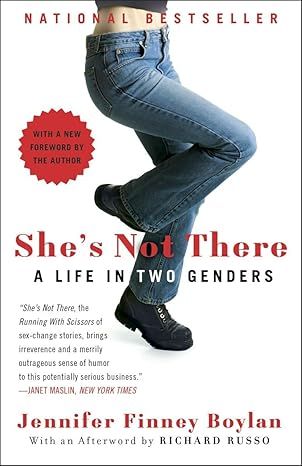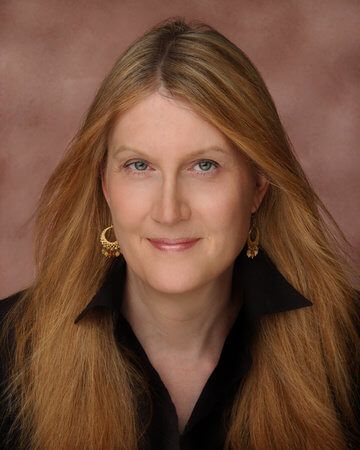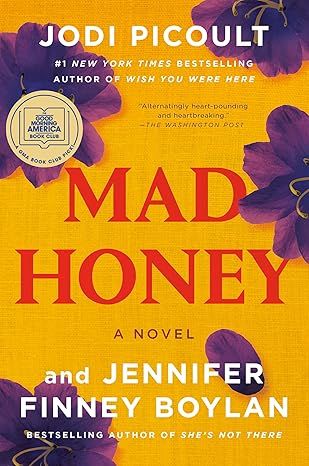She's Not There: A Life in Two Genders
4.5
-
1,610 ratings
The bestselling, seminal work of trans literature: a story of love, sex, selfhood, and understanding from Jennifer Finney Boylan
When she changed genders, she changed the world. It was the groundbreaking publication of She’s Not There in 2003 that jump-started the transgender revolution. By turns hilarious and deeply moving, Boylan – a cast member on I Am Cait; an advisor to the television series Transparent, and a contributing opinion writer for the New York Times -- explores the territory that lies between men and women, examines changing friendships, and rejoices in the redeeming power of love and family.
She’s Not There was one of the first works to present trans experience from the perspective of a literary novelist, opening a door to new understanding of love, sex, gender, and identity. Boylan inspired readers to ask the same questions she asked herself: What is it that makes us---ourselves? What does it mean to be a man, or a woman? How much could my husband, or wife, change—and still be recognizable as the one I love?
Boylan’s humorous, wise voice helped make She’s Not There the first bestselling work by a transgender American--and transformed Boylan into a national spokeswoman for LGBTQ people, their families, and the people that love them. This updated and revised edition also includes a new epilogue from Jenny’s wife Grace; it also contains the original afterward by her friend, novelist and Pulitzer Prize winner Richard Russo.
“Love will prevail,” said Boylan’s conservative mother, as she learned about her daughter’s identity. She’s Not There is the story that helped bring about a world in which that change seems almost possible.
Kindle
$12.99
Available instantly
Audiobook
$0.00
with membership trial
Hardcover
$19.10
Paperback
$13.29
Ships from
Amazon.com
Payment
Secure transaction
ISBN-10
0385346972
ISBN-13
978-0385346979
Print length
352 pages
Language
English
Publisher
Crown
Publication date
April 29, 2013
Dimensions
5.18 x 0.73 x 7.94 inches
Item weight
9.6 ounces
Product details
ASIN :
B00A9ET4UE
File size :
9279 KB
Text-to-speech :
Enabled
Screen reader :
Supported
Enhanced typesetting :
Enabled
X-Ray :
Enabled
Word wise :
Enabled
Editorial reviews
"Beautifully crafted, fearless, painfully honest, inspiring and extremely witty. Jennifer Finney Boylan is an exquisite writer with a fascinating story and this combination has resulted in one of the most remarkable, moving and unforgettable memoirs in recent history." ---Augusten Burroughs, author of Running With Scissors
"In addition to being a complete delight, this book should make us all question what we mean when we use the words love, marriage, and friendship. Jennifer Finney Boylan is a great gift to womanhood." --Haven Kimmel, author of A Girl Named Zippy
Sample
Mr. Fun Hog
(December 2001)
There they were, two young women standing by the side of the road with their thumbs out. They weren't warmly dressed, considering that it was December, in Maine. One of them had green hair. They looked to me as if they were in trouble, or about to be. I pulled over, thinking, better me than someone else. The world was full of characters.
"Can you take us to Augusta, ma'am? The Middle Road?" said the one whose hair was not green.
"Yes, of course, I'm going right past there," I said. "Climb in."
Soon they were in the car and we were driving west. The smell of pot wafted from the women, and I thought about the fact that my purse was on the floor in the back next to Green Hair.
"Wow, lady," said the girl next to me, looking at all the equipment in the minivan. "You sure have a lot of stuff. What is that, a guitar?"
"Synthesizer," I said. "I was playing at a Christmas party at the Samoset Resort last night. I was sitting in with the Roy Hudson Band."
"Whoa, I know them," said Green Hair, suddenly impressed. "You play with them? They're great. The Roy Hudsons used to play at Colby when I went there."
I glanced in the rearview mirror to get a better look at her. Something in her voice was familiar. "You used to go to Colby College?" I said. I was about to say, I'm chair of the English department there, but hesitated.
"Yeah," she said. "A couple semesters, a long time ago. Couldn't hack it."
It was possible, although not certain, that Green Hair was named Ashley LaPierre, who'd been a student of mine back when I was a man. Looking at her now, all I could think was, wow, she's really changed.
The class Ashley had been in was Love, Literature, and Imagination, the introduction to fiction, poetry and drama for non-majors. I loved teaching that course, and sometimes did it as a great big lecture class where I stood at the front of the room and sang. We read a wide range of stuff, most of it having to do with people trying to find the courage to do something impossible. We talked a lot about the journey of the mythic hero, about the slaying of dragons and the attainment of illumination.
I used to stand there at the lectern in my coat and tie, waving my glasses around, urging students to find the courage to become themselves. Then I'd go back to the office and lock the door and put my head down on the desk.
Ashley LaPierre had dropped out of Colby in the middle of that semester, which broke my heart. I remembered she'd been a fine writer though, shining in both my class as well as in Richard Russo's fiction workshop.
Now, six or seven years later, Ashley--assuming it was she-- didn't seem to recognize me, which wasn't a surprise, seeing as how I didn't use to be female. I was wearing blue jeans and a coral knit sweater. My long blonde hair fell just above my breasts.
"So what are you girls up to?" I asked.
"We was walking into Augusta," said the one next to me. "Pickin up this pit bull."
"I'm Jennifer, by the way," I said.
"Stacey Brown." The other girl didn't introduce herself. Stacey punched in my lighter.
I wanted to say something about how we didn't allow smoking in our family, but decided not to. The car was full of amplifiers and sound modules and monitors anyway, and I'd just spent a night playing songs like Hey Bartender and Mustang Sally for a bunch of tattooed millworkers. It didn't seem like the time to start lecturing these girls on the dangers of nicotine.
"You live around here?" I said. Ashley was looking out the window.
"We live on a farm," said Stacey. "We got five cats, three hens, one rooster."
"Any eggs?"
"Nothin'," said Stacey.
The lighter clicked out and she lit up a cigarette from a pack of generic smokes.
"So you live out there by yourself?"
"Yeah," said Stacey. "Since our boyfriends went to jail."
I looked at Ashley in the rear-view mirror. She smiled for a moment, as if at some happy memory. The smile accentuated her apple cheeks, her bright, shining eyes.
"Who owns the pit bull?" I asked.
"We don't know, some guy who calls himself Speed Racer. He's got a brown trailer. We saw the dog advertised in Uncle Henry's. We been thinking about getting a pit bull for a long time."
The smile faded off of Ashley's face.
One day Ashley La Pierre had come into the office I shared with Russo to talk about a paper she was trying to write on "The Love Song of J. Alfred Prufrock." She was wearing gigantic black boots with clunky heels. Ashley's eyes fell upon a poster of the Marx Brothers on the wall above the file cabinet. "Who are those guys?" she asked.
"The Marx Brothers," I said. "Groucho, Chico, Harpo. You've never heard of them?"
She shrugged. "Nah. Anyway. This poem? Prufrock's Love Song?" She spoke with that feminine-inflected voice that makes every statement sound like a question. Occasionally I brought the symbolism of this inflection to my students' attention, especially when I asked for their names and they answered me as if they weren't sure what they were. Megan? Heather? Ashley? "Say your names as if you are proud of them," I'd urge my students. "Your identity is not a question."
Now that I was female, that same inflection often snuck into my own voice, a fact which both amazed and infuriated me. Hello? I'm Jenny Boylan?
"Yes," I'd said to Ashley. "We talked about it in class." I'd been sitting at my desk chair, next to my computer. I'd been wearing Dockers and a tweed jacket, a blue Oxford shirt and a brown tie. It seemed like a long time ago. I had a mop of brownish-blonde hair and small round wire-rim glasses, a fountain pen, stubble.
"See, that's the thing," Ashley said. "The way that opens, let's get out of here, the both of us, while--whatever--"
"Let us go then, you and I! While the evening is spread out against the sky, like a patient etherized upon a--"
"Yeah, yeah," Ashley said. "See, in class we were talking about how like, that's him talking to this girl, right? Only I don't see it that way at all."
"No?" I said. "Well how do you read it?"
"I think he's standing in front of a mirror," she said. "And it's like he's this person cut in half, you know, it's like he's got this half of him that everybody thinks is cool, like he's Mister Fun Hog, but in fact he's totally scared of everything. It's like he's got this person he's invented and then there's this other person who's really him and he's trying to talk to this other person, trying to like, convince him to get the hell out of there."
I nodded. "So you feel that J. Alfred Prufrock is torn in half?"
She looked at me as if I hadn't read the poem. "The fuck yes," she said. "Don't you?"
I nodded again. "I do." I was having a hard time concentrating. "So is he crazy?"
"Crazy?" Ashley said. "Hell no. Everybody feels like that. Don't they?"
We drove toward Augusta in silence. Every now and then I'd ask a question, or make some clever observation, but mostly I just let things stay quiet. Back when I was a boy, I'd hitchhiked lots of times, and there was nothing worse, sometimes, than a driver who was determined to make you talk.
We got to Middle Road in Augusta, and I drove down the street first one way, then another--but there was no brown trailer. "Are you sure it was Middle Road?"
"Middle Street," said Ashley.
"Do you have directions?" I asked.
"Yeah," said Stacey. "It's like you go down this road and then there's some sort of intersection or something?"
We let this sink in.
"Why don't we call?" I said, and pulled in to a Mobil station. Stacey looked at me, embarrassed. "Here," I said, pulling a quarter out of the cup holder. "My treat."
As Stacey went off to the pay phone, I sat in the car with Ashley. I suddenly had this unbearable urge to turn around and say, Ashley, it's me, Professor Boylan. Remember? I'm like, a woman now? I had this sense that, for the first time, there wasn't some kind of invisible wall between us, that for the first time I could actually be known by her. But that wasn't true. There were all sorts of walls between us, even now.
I turned on the radio. A chorus of voices singing in a cathedral. Thomas Tallis' 40-Part Motet.
Stacey came back to the car. "Okay, I got it," she said.
I headed out into traffic. "What do we do?" I said.
"You go like, along some way, and then there's some kind of like, turn or something, and then there's some other road?"
I nodded.
I had a hunch where Middle Street was, and we drove through Augusta, Maine's hard-bitten capital, towards Belgrade.
Two little girls were playing in the front yard of a row house.
"Go on, play little girls," said Ashley. "Enjoy it while you can."
"Yeah," said Stacey. "They don't even know the shit they're in."
"You got kids, Jenny?" Ashley said.
"Yes, two boys. They're seven and five."
"You have 'em by Caesarian?" she asked. This wasn't the question I was expecting.
"Don't ask her that," said Stacey. "Jesus, like it's any of your business."
"I just think it's interesting," said Ashley. "All my friends are Caesarians, all of them. Don't you think that means something? It's like, all Caesarians ...
Read more
About the authors
Jennifer Finney Boylan
Jennifer Finney Boylan is the author of sixteen books, including GOOD BOY: My Life in Seven Dogs. Since 2008 she has been a contributing opinion writer for op/ed page of the New York Times; her column appears on alternate Wednesdays. A member of the board of trustees of PEN America, Jenny was also the chair of the board of GLAAD for many years. She is currently the Anna Quindlen Writer in Residence and Professor of English at Barnard College of Columbia University.
Jenny is a well known advocate for human rights. She has appeared five times on the Oprah Winfrey Show and has also been a guest or a commentator on Larry King Live, Good Morning America, and The Today Show. She is also a member of the faculty of the Breadloaf Writers' Conference of Middlebury College as well as Sirenland, in Positano, Italy.
She lives in Maine with her wife Deirdre. They have two children.
Read more
Reviews
Customer reviews
4.5 out of 5
1,610 global ratings
New England Yankee
5
Light Touch, Heavy Topic
Reviewed in the United States on February 12, 2012
Verified Purchase
She's Not There is one of the best transgender biography titles written to-date. It will appeal somewhat differently to the transgender and non-transgender populations because the latter will take Jenny's treatment as somewhat light in tone, while the transgender population will read and recognize considerably more of the realities behind her account.
Jenny Boylan is a remarkably able storyteller. She weaves circumstances over time together in deft fashion. A story, a comment, a thought, a seemingly minor theme described at one point in her life and story becomes a point later on, a pattern repeated again and again. This is life with meaning, described as a whole. Most people feel this way about their lives. Few can describe connectedness in such evocative fashion.
The topic - gender identity at the level of transsexuality - is life and death. That applies to Jenny and it applies to Grace, James/Jenny's wife, whose personal transition is also described. Jenny lays life itself on the line as she comes to terms with living an authentic life. If the tone sometimes appears light, one should appreciate that by the time a transgendered person moves toward transition, much of the emotional crisis has already passed, even if the circumstances of life are put at risk. Jenny describes this well - and also well-describes, through Grace's own transition crisis, how that same point is just the beginning for a spouse.
The second half of the book is taken with transition, including hormones, surgery, and social transition to female presentation and full-time living. Grace's perspectives weigh in here, as do those of close friends, particularly Richard Russo. Russo's letters to Jenny are incredibly personal, revealing, and direct and could easily serve as required reading for anyone interested in how interpersonal dynamics are challenged and change with transsexual transition in the picture. Russo also provided the afterword, and it's a brilliant piece of writing, worthy as a standalone piece.
Great writing, great story. Real. And readable! Absolutely 5 stars.
Read more
Nancy T
5
a story of beautiful relationships
Reviewed in the United States on December 14, 2023
Verified Purchase
Beautifully written, heartfelt and enlightening. I was in awe of the relationship between Russo and Jim and then Jenny. The honestly, the caring and the struggle were inspiring.
Aimee Pollak
5
heartfelt and hopeful and hilarious
Reviewed in the United States on February 17, 2023
Verified Purchase
I read this book after I read the novel Mad Honey, which Jennifer Boylan co-authored. I found the novel’s dive into transgender issues heavy handed and preachy. (Not the parts by this author). But the half written by Jenny intrigued me, and led me to this 20 year old memoir that was fantastic and eye opening for a cis gender female like me. I am so grateful to Mad Honey for leading me here, and now I’m excited to read some of Jenny’s fiction. But first I’m going to read Empire Falls by her BFF Richard Russo
Read more
5 people found this helpful
Top Jennifer Finney Boylan titles
View allSimilar Books
Best sellers
View all
The Tuscan Child
4.2
-
100,022
$8.39

The Thursday Murder Club: A Novel (A Thursday Murder Club Mystery)
4.3
-
155,575
$6.33

Sapiens: A Brief History of Humankind
4.6
-
140,302
$13.49

The Butterfly Garden (The Collector, 1)
4.3
-
88,556
$9.59

Things We Hide from the Light (Knockemout Series, 2)
4.4
-
94,890
$11.66

The Last Thing He Told Me: A Novel
4.3
-
154,085
$2.99

The Perfect Marriage: A Completely Gripping Psychological Suspense
4.3
-
143,196
$9.47

The Coworker
4.1
-
80,003
$13.48

First Lie Wins: A Novel (Random House Large Print)
4.3
-
54,062
$14.99

Mile High (Windy City Series Book 1)
4.4
-
59,745
$16.19

Layla
4.2
-
107,613
$8.99

The Locked Door
4.4
-
94,673
$8.53








